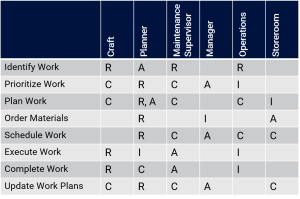
Tie all the Roles & Responsibilities Together in an Easy To Use Document
This is the final post in the series on roles & responsibilities and is the final step in ensuring the team is working together. So far in the series we cover the importance of defining role & responsibilities. How to determine roles & responsibilities, and the major roles in the maintenance department. In the last post, we will cover how to tie it all together in a simple, easy to use document. A RACI.
What is a RACI?
A RACI is a chart that identifies the individuals in a process and identifies who is;
- Responsible: Who Actually Does It?
- Accountable: Who Has Authority To Approve Or Disapprove, or Answers for the completeness of the task
- Consulted: Who Has Needed Input About The Task?
- Informed: Who Needs To Be Kept Informed About The Task?
When each process is presented in this fashion it is easy to see how is executing each step in the process and how the other roles are involved.
Why a RACI is Important?
A RACI chart is vitally important as it takes all the roles, responsibilities and accountabilities and makes then easy to follow. The RACI chart breaks out the roles & responsibilities for each individual process, ensuring there is complete visibility to each step in the process. Lastly, it ensures that each process is clearly laid out and everyone knows who they can count on for what.
How to Use a RACI with Roles & Responsibilities

With the roles for a specific process identified, it is now possible to create a RACI chart.
To create the RACI chart, you first list the steps of the process in the left hand column, and list the specific functional roles across the top of the chart.
The chart is then populated with the appropriate RACI. This is ideally done as a team, after reviewing the process. This then allows for challenges and builds, to create a sense of ownership within the team.
In the end you can see the steps within the process and who is responsible, accountable, consulted and informed for each step of the process. This ensures that everyone know what they need to do to make the process work and who is the decision maker.
Review the RACI
Once the chart has been populated, we need to review the chart to ensure it will work for the team, without overloading individuals or creating bottlenecks.
First we review the chart vertically for each functional role;
- Are there too many R’s for one person? If one role has a lot of R’s, can they handle the work load? If not spread the work around.
- If there are no A’s or R’s can this role be eliminated from the process? To make the process efficient, we need to remove anyone from the process that is not needed.
- Are there too many A’s? If an individual has too many A’s a decision bottleneck may exists?
Once the all roles have been reviewed, it is time to review the Step or the Chart horizontally
- Are there no R’s? If not, then who will actually perform this step?
- Is there too many R’s? If everyone is working on the same step, will it be a mad rush, leading to poor outputs?
- Is there more than one A? There can only be a single decision maker for each step. If there are 2, determine who would be best informed to make the decision, and who will have to answer for the process failing at that step
- Are there too many C’s or I’s? This can lead to extended times to complete the step. We want to keep people informed and consulted, but do so within reason
The Chart is now complete, and can be shared amongst the team for reference. It is important to review the chart with the team and ensure everyone is clear.
The last thing to do is to ensure that the chart is kept up-to-date when any process changes are made.
Do you have a RACI for all major processes? If not, you may be duplicating work, or at a minimum, making the work inefficient.
Remember, to find success, you must first solve the problem, then achieve the implementation of the solution, and finally sustain winning results.
I’m James Kovacevic
HP RELIABILITY
Solve, Achieve, Sustain
Follow @HPReliability
 Ask a question or send along a comment.
Please login to view and use the contact form.
Ask a question or send along a comment.
Please login to view and use the contact form.
Leave a Reply